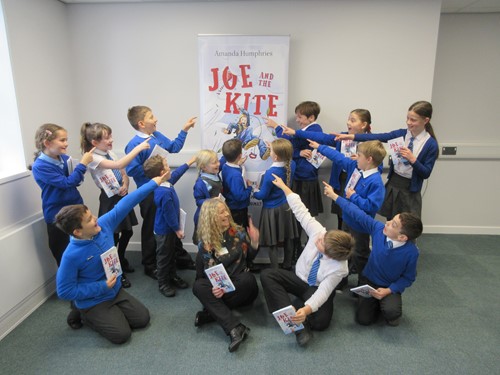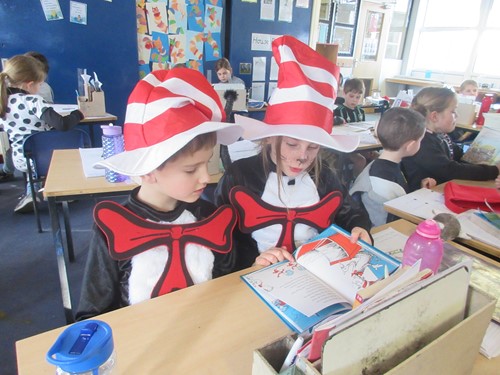|
C U R R I C U L U M
I N T E N T
|
Intent
Literacy is at the heart of all children’s learning. Literacy enables children both to communicate with others effectively for a variety of purposes and to examine their own and others’ experiences, feelings and ideas, giving these order and meaning. Because literacy is central to children’s intellectual, emotional and social development it has an essential role across the curriculum. We believe that a secure basis in literacy skills is crucial to a high-quality education and will give our children the tools they need to participate fully as a well-rounded member of society.
At Cleobury Mortimer Primary School, through a well-balanced curriculum, all pupils will become confident speakers, listeners, readers and writers and use these language skills for a wide range of purposes. Therefore, at Cleobury Mortimer Primary School, we will also enable children to:
· be competent in the arts of speaking and listening, communicating their understanding and ideas clearly and using discussion in order to learn; · show children how to adapt their speech to a wide range of circumstances and demands; · teach children effective communication, both verbal and non-verbal, through a variety including through drama activities; · secure their phonic knowledge in order to decode words easily and read them aloud fluently and accurately; · explore the content of a range of texts to ensure full understanding of what they have read; · become confident, enthusiastic, independent and reflective readers who develop a habit of reading a variety of texts for both pleasure and information; · develop as reader alone or as a shared experience with adults and peers; · foster and instil the enjoyment of reading, and a recognition of its value; · use their phonetic knowledge to write with accuracy and build quality sentences; · write clearly and coherently, adapting language and style for a range of contexts, purposes and audiences; · write ambitiously and confidently by planning, rehearsing aloud, drafting and editing their writing; · to foster and instil the enjoyment of writing, and a recognition of its value; · develop a secure understanding of spelling, grammar and punctuation; · make fair critical responses about their own work, that of their peers and for a range of writers; · produce clearly formed, concise, legible handwriting and to take pride in the presentation of their work.
|
|
C U R R I C U L U M
I M P L E M E N T A T I O N
|
|
|
C U R R I C U L U M
I M P A C T
|
Impact When the children leave CMPS at the end of KS2, they should have made good progress from their starting points. Each year we track the children’s progress with the aim of ensuring that they fulfil their potential. Most importantly, we want children to be enthusiastic readers, who can communicate effectively both orally and in writing so they are ready for the next stage of their education.
Intended Impact – Reading We monitor the impact of our Reading approach through: -End of EYFS and KS2 statutory assessments and the Year 1 phonics check. (We always aim for at least 90% in the phonics check) -The % of pupils working at ARE within each year group will be at least in line with national averages. -Assessment tracking information being shared and discussed with SLT three times per year within pupil progress meetings identifying key children requiring support or challenge. Pupils are set targets based on FFT data. These are reviewed three times per year. -Learning walks, observations and work trawls to monitor quality. -Whole staff benchmarking sessions focussed on progression of one area of reading across the school to monitor progress and standards and inform staff CPD. -Liaising with parents. We closely monitor children making the slowest progress. Children in danger of falling behind, or who are working under expected levels (lower 20%), are swiftly identified and enough additional support is provided to enable them to keep up.
Intended Impact – Writing -Pupils will enjoy writing across a range of genres -Pupils of all abilities will be able to succeed in all English lessons because work will be appropriately scaffolded -Pupils will have a wide vocabulary that they use within their writing -Pupils will have a good knowledge of how to adapt their writing based on the context and audience -Moderation takes place both in school and across the SGET. Pupils will leave primary school being able to effectively apply spelling rules and patterns they have been taught -The % of pupils working at ARE within each year group will be at least in line with national averages. -The % of pupils working at Greater Depth within each year group will be at least in line with national averages -The will be no significant gaps in the progress of different groups of pupils (e.g. disadvantaged vs non disadvantaged) -We closely monitor children making the slowest progress. Children in danger of falling behind, or who are working under expected levels (lower 20%), are swiftly identified and enough additional support is provided to enable them to keep up. This includes guided writing in the classroom.
|



